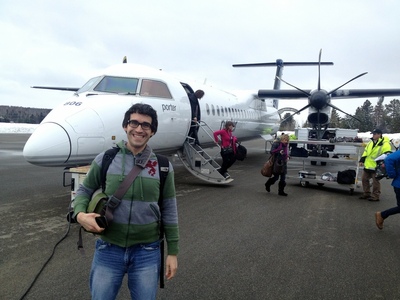Ever since I started thinking more about my health I find that I am allocating much more time (and slightly more money) to food. I've always cooked, but now I cook much more and when I'm not cooking I'm often thinking about my next cooking adventure. When I buy meat or eggs or fish I now spend more money to get versions of those things that are produced in a more natural way. I spend time researching new foods and recipes and means of preparation on the Internet. I read blogs and watch videos about food.
Last night I came to the realization that not only is there nothing wrong with these changes, they are almost certainly changes for the better.
For most of human history almost everyone in the world would spend most of their time and a huge percentage of their money just to get enough to eat. This meant people were much more aware of what their food was and where it came from. Now, at least in North America, people spend a comparatively miniscule proportion of their income on groceries and most people have little to no contact with the means of food production. And cooking? That's a dying art in the average North American home.
More than anything it seems to me that this increasing dissociation from food is the main cause of our society's numerous food related issues (obesity, diabetes, etc.). My own personal changes have suggested to me that the best dietary change one can make is to just eat real food. Lots and lots of vegetables. Some fruits and nuts. Non-gluttonous amounts of meat and eggs and fish that were produced in healthy natural ways. A bit of healthily produced dairy (hard to do in Canada, damn Canadian Dairy Commission). Extremely limited sugar and processed food (including bread).
However to make those changes one needs to know what real food is. It's not hard, but if no one ever tells you how do you figure it out? If you grow up in a home where your parents didn't cook and if your school does not teach you about food (do any??) why would you ever think to question what you eat?
My point is that I think it is right that I am spending more time and money on my food. It means I'm more actively engaging with it. I'm thinking about it and being conscious of it. If it means I have less money for more frivolous things then that is fine as such things don't really make a person happier anyway (more on that in a later post). And thinking larger, I'm starting to wonder how I can help improve the world through my passion for food.
Although this topic has been bubbling around in my brain for a while it solidified recently after watching a few TED Talks on Netflix about food. If you want to check them out then the ones I found most interesting were as follows (note interest does not always imply total agreement):
- Allan Savory: How to green the desert and reverse climate change
- Jamie Oliver's TED Prize wish: Teach every child about food
- Carolyn Steel: How food shapes our cities
- Dan Barber: How I fell in love with a fish
- Mark Bittman: What's wrong with what we eat
- Dan Barber's foie gras parable
- Ann Cooper talks school lunches
- Pam Warhurst: How we can eat our landscapes
- Ron Finley: A guerilla gardener in South Central LA









